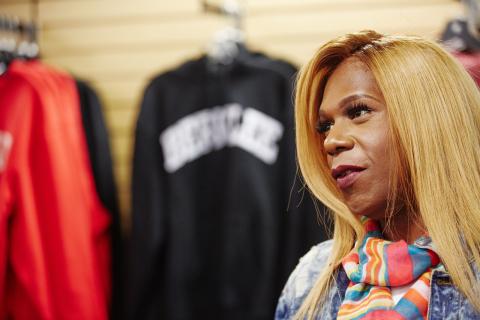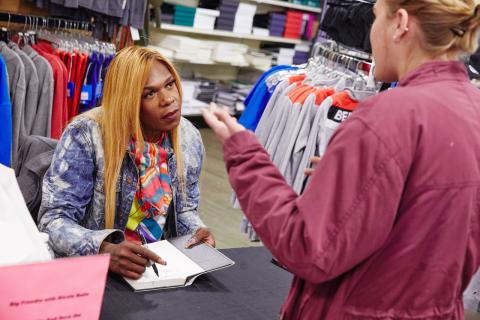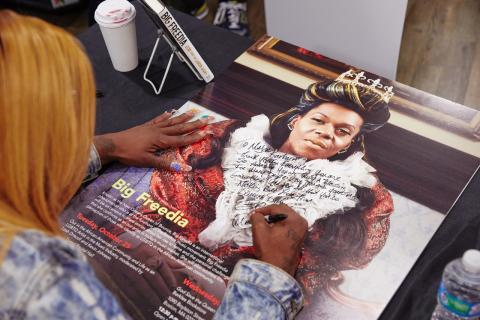Big Freedia Brings Label-Defying Bounce to Berklee

New Orleans-based bounce music star Big Freedia visited Berklee during her recent tour stop in Boston.
Dave Green

During her campus visit, Big Freedia did a booksigning in the Berklee Bookstore and had a chance to speak with fans.
Dave Green

Big Freedia signs a poster for a fan during her visit to Berklee.
Dave Green
Before Big Freedia, the New Orleans-based bounce music icon who transcends genre and gender, walked on stage to deliver an empowering, honest, live interview at Berklee's David Friend Recital Hall, a music video for the Big Freedia song "Explode" graced the screen in the concert hall. Prior to the song proverbially exploding into the bounce music dance jam that it is, Big Freedia offers an inspiring primer on identity, saying, “People get confused by if I am he or she. I am more than just Big Freedia. I am more than just Queen Diva. I am more than just Freddie Ross. I am me.”
The video preemptively answers a number of questions that Freedia has no doubt had to respond to since she began her career as a bounce music artist in 1998. No stranger to challenging cultural assumptions, she was born Freddie Ross, identifies as a gay male, answers to either he or she, and is passionate about her faith in God, her roots in Gospel music, and the New Orleans community.
Watch the music video for "Explode" by Big Freedia:
The crowd at David Friend Recital Hall came ready to engage on a much deeper and more nuanced level, clearly relishing the opportunity to hear Big Freedia speak about everything from facing the challenges of being an openly gay, African American artist in the music industry to getting to collaborate with the Queen Bey herself, Beyoncé.
Cohosted by the Reach Out Initiative and the Office of Diversity and Inclusion, the interview-format discussion was moderated by Berklee staff members Leah Driscoll and Kevin Johnson, with ample time for questions from students in the audience.
The edited and abridged quotations from Big Freedia below offer a sampling of the topics covered in the discussion.
On Bounce Music
“When I give someone a definition of bounce music, I simply tell them that bounce music is up-tempo, it’s heavy bass, it’s call-and-response—I say something and y’all respond—and it’s fun music for all walks of life.”
“Bounce music has been going on for about three decades now. At dances in middle school they’d play people like DJ Jubilee, Partners in Crime, and Miss T. It would have everyone at the dance super excited. We’d be flipping on the walls, just tearing it down.”
“Something hit me [around 2005] and I was like, ‘Girl, you gotta take this to the world.’ I had done everything from birthday parties to weddings and even funeral repasses (if there’s somebody dying, they hire a bounce artist to come and cheer people up! That’s how we do it in New Orleans.) I had done everything. Now it was time to take this to another level, and push it further out.”
On Being a Gay Artist in the Music Industry
“I jumped in the bounce game around 1998-'99 when I started to background for [bounce artist] Katy Red. Katy was the first transgender artist to come in the game and it definitely changed the game.”
“Being that [Katy Red] was black and that she was gay, it was a struggle. It was something that people were definitely not ready for just yet. When she jumped into the game, we had stuff thrown at us…We never gave up though, and we became the hottest artists in the city.”
“A lot of times artists don’t want to work with you because of your sexuality when it doesn’t have anything to do with the music. They’re afraid they’re going to be categorized. I still deal with that all the time.”
“If you feel like coming out will hurt your brand, maybe you don’t need to be an artist. If you try to hide your hand, it will still be shown. A lot of times people can see right through you. You can’t hide who you are, so why hide it? Be who you are and be the best at it.”
“I keep myself surrounded by good people, people that love me and support me, and that keeps me moving in the right direction.”
On Fame
"There is no more privacy because you become a public figure. So it becomes really important to watch everything that you do. I continue to remain humble. A lot of times, I don’t look at myself on a certain level. I continue to be who I was in the beginning. It’s very important to make the right decisions in your life and in your career. My ethic is just to work and put New Orleans and bounce music on the map.”
“I used to manage everything on my own. Now I have the professional people to keep everything straight and in line. It’s important to keep up with your business affairs. I’m very hands-on. You have to trust people and let them guide you in the right direction. You’re going to make mistakes—no one’s perfect, and you learn as you grow. No matter how much you trust someone, it’s your business. If you put everything in someone else’s hands, and it comes down to the IRS coming, they’re not coming for the people who handled it—they’re coming for you.”
On Working with Beyoncé
“That was definitely a life-changing moment when she called me. When she called me directly, I was just at home—I thought I’d died and come back to life.”
“It was just like a dream come true, and something I’d been wanting and waiting for. In this business, a lot of times you have to be patient. Things don’t happen overnight. I’ve been doing this for a very long time, and when you feel like you want to give up, that’s just when another door opens.”
